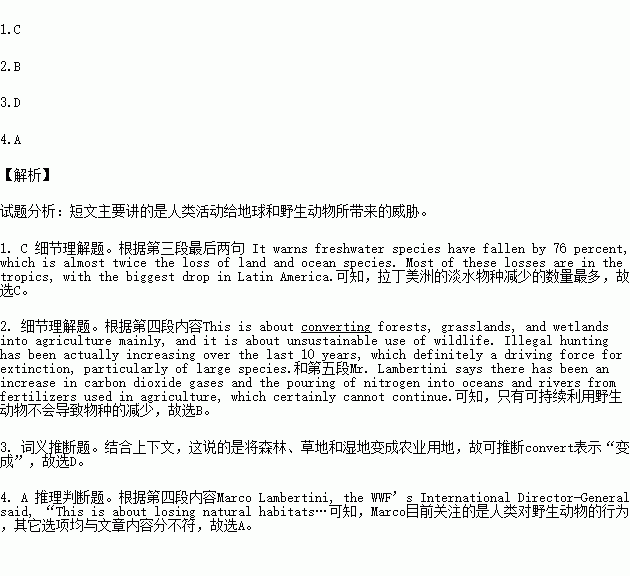题目内容
The World Wildlife Fund (WWF) says more than half of the world’s wildlife population has been lost, which the conservation group says has placed the health of the planet at risk.
The WWF recently released its 10th Flagship Living Planet Report. The group warns the condition of the world's animals is worse than its earlier reports showed, indicating worldwide action is needed.
The WWF is worried about the loss of and damage to Earth’s environment. The report provides information about more than 10,000 animal populations from 1970 to 2010. These populations are called “vertebrate species,” or animals with backbones — like fish, birds, mammals, amphibians and reptiles. The report shows these populations have dropped by 52 percent in just 40 years. It warns freshwater species have fallen by 76 percent, which is almost twice the loss of land and ocean species. Most of these losses are in the tropics, with the biggest drop in Latin America.
Marco Lambertini, the WWF’s International Director-General said, “This is about losing natural habitats. This is about converting forests, grasslands, and wetlands into agriculture mainly, and it is about unsustainable use of wildlife. Illegal hunting has been actually increasing over the last 10 years, which definitely a driving force for extinction, particularly of large species.”
The report also notes what it calls the world’s “Ecological Footprint”, that is, the effect of human activities on the planet. Mr. Lambertini says there has been an increase in carbon dioxide gases and the pouring of nitrogen into oceans and rivers from fertilizers used in agriculture, which certainly cannot continue.
“We are consuming on average every year about the equivalent of about 1.5, one and a half times the resources available to the planet. That means we are cutting trees more quickly than they can be restored. We are fishing the oceans more quickly than fishing stocks can reproduce, and we are emitting in the atmosphere more CO2 than the natural systems can actually absorb, which is clearly not sustainable.”
Mr. Lambertini warns climate change affects almost everyone on the planet and that whole species may disappear if the world does not reduce the effects of humans on the climate.
1.According to the passage, what kind of species faces the biggest drop in population?
A. Land and ocean species.
B. Animals with backbones.
C. Freshwater species in Latin America.
D. Freshwater species in the tropics.
2.All the following can contribute to the loss of world’s wildlife population EXCEPT ________.
A. turning wildlife habitats into agriculture land.
B. making sustainable use of wildlife.
C. hunting illegally.
D. emitting CO2 gases and pouring nitrogen.
3.Which does the underlined word “converting” in paragraph 4 mean?
A. Conserving. B. Conveying.
C. Exchanging. D. Transforming.
4.It can be inferred from the passage that _______.
A. Marco is much concerned about human’s current behaviors towards wildlife.
B. what the planet provides now can satisfy human’s sustainable development.
C. more than half of the world’s wildlife population has been lost.
D. if humans reduce the effects on the climate, the whole species will not disappear.
 名校课堂系列答案
名校课堂系列答案
